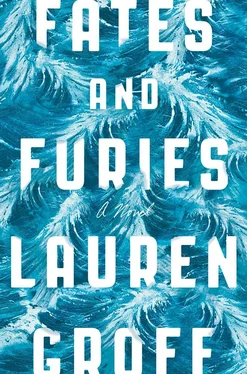He shrugged at the cashier, whose eyes narrowed, who said something menacing in Spanish. He put the plate down, and said, “I’m sorry, lo siento ,” until he backed all the way to the door.
At last, he found himself in a horseshoe-shaped strip mall, where, out of the corner of his eye, he saw something that made a flutter of astonishment in his chest: a telephone booth, the first he’d seen in, what, decades? He found himself dialing collect the only number he still knew by heart in this age of cell phones. Such a relief, the weight of the receiver in the hand, the reek of others’ breath and grease. His mother’s voice rose on the other end. Collect? Oh dear, oh dear, yes, she’d take it, and then she said, “Lancelot? Darling? What’s wrong? Is it that wife of yours? Gracious, has she left you?”
He swallowed. He felt a strange echo of having lived this moment before. When? College, just after the Saturday marriage ceremony, when he ran up to his dorm, how small it had suddenly seemed, skim-coated with childhood. After he’d stuffed his clothes into a duffel for the stolen honeymoon on the Maine coast, he picked up the phone with suppressed glee and called his mother to tell her he was married. “No, you’re not,” she’d said. “I am. It’s done,” he’d said. “Undo it. Quickie divorce,” she’d said, and he’d said, “No.” She’d said, “What kind of girl would marry you, Lancelot? Think. An immigrant? A gold digger?” “Neither,” he’d said. “A Mathilde Yoder. The best person on the planet. You’ll love her.” “Won’t,” she’d said. “I’ll never meet her. You get it annulled or you’re disinherited. No more allowance. And how are you going to survive in the big bad city without money? How are you going to survive as an actor ,” she’d said, and he’d smarted at the sneer. He’d thought of a life empty of Mathilde. He’d said, “I’d rather die,” and she’d said, “My darling, you will eat your words.” And he’d sighed and said, “I hope you and your tiny heart have a great life together, Muvva,” and hung up. The wedge had been driven all the way in.
He felt sharp now in the California sunlight. Nauseated. “What did you say?” he said.
“I’m truly sorry,” his mother was saying. “I am. All those years I’ve bitten my tongue, darling. All the pain between us, all the distance, all of it unnecessary. That horrible creature. I knew she’d end up hurting you. Just come on home. Rachel and Elizabeth and the kids are here for a visit. Sallie would leap the moon to baby you again. Come on home and your women will take care of you.”
“Oh,” he said. “Thank you. But no.”
“Sorry?” she said.
“I called because I lost my cell,” he said. “I wanted to let Sallie know in case Mathilde was frantically calling around for me. Tell her I’ll be home soon with the champagne and cheese for the party,” he said.
“Listen, darling—” Antoinette began, but Lancelot said, “Bye,” and she said, “I love you,” into the dead phone.
Antoinette put down the receiver. No, she thought. He hadn’t chosen that wife over his mother again. Not when Antoinette had given him everything. Without her, he would never have become what he was; he never would have written her into immortality the way she’d groomed him to do. Boys belong to their mothers. Cord cut decades ago, but they’ll always share the warm, dark swim.
The ocean out the window cast its net of waves onto the white sand, withdrew it, catching nothing. Antoinette knew the little pink house on the dunes was listening, her sister-in-law rolling peanut butter cookies in the kitchen, her daughter and grandchildren just coming in from the beach, the outdoor shower spitting on below where she sat. Lord give her strength, but she was sick of these dark, small, fearful people. Surely it was natural she’d love them less than she loved her son, who was big and golden like her. Mice are nice but lions roar.
In the kitchen, Sallie rolled dough in greasy palms, fretting. The phone had rung and Antoinette’s voice had risen in her bedroom sharply. “Is it that wife of yours?” she’d said. Sallie considered her sister-in-law; though she appeared confected of sugar and air, there was a bitter black walnut at her core. Sallie worried for Lancelot, poor child, whose sweetness went all the way through. She considered calling Mathilde to see what was going on but refrained. Nothing is gained in the immediate; her work was slow and at a distance.
After some time, Antoinette stood, and with the movement, she caught sight of her own face in the vanity mirror. Wrinkled at the corners, exhausted, swollen. Well, no wonder. Such a force of effort it cost her to keep her son safe. The world more perilous by the moment, liable to disintegrate if she wasn’t constantly vigilant. The things she had done for Lancelot, the sacrifices she’d made! She thought of the grand reveal when she was dead, the strings he’d never know she’d pulled until she was gone, the horrors she’d endured for his sake. Did she choose to plant herself here in this shabby pink house? She did not. With the money Gawain left, she could have been bathing in luxury. Top floor of the Mandarin Oriental in Miami, room service and steel bands summoned at whim. Marble bathrooms the size of this shack. Sunlight like diamonds on the water below. But she wouldn’t touch more of Gawain’s money than she must to survive. It was all for her children, their shocked faces when they knew the extent of what she’d done. She brought the old comforting image before her again, so real that it was like a scene she’d watched in rerun on television: her son in a black suit — she hadn’t seen him in decades; in her mind he was still the gawky, pustuled child she’d let the North swallow up — his shirt threadbare, his wife all drab in cheap black, tartishly made up. Blue eye shadow, brown lip liner, feathered hair, she imagined. Sallie would hand him the envelope with the letter in which Antoinette had explained it all, everything she had done for him. He would turn away, choking, open it, read. “No!” he’d shout. And when his wife would touch his shoulder tentatively, he’d shake her off, bury his face in his hands, mourning all the years he neglected to be grateful to his mother.
Rachel came down the hallway and saw Antoinette standing in her room. When Antoinette looked up into the mirror, she saw her daughter and slipped her smiling face over the stern one like a mask. Her teeth were still beautiful. “I believe Sallie made cookies for the little ones, Rachel,” Antoinette said. She moved her huge body through the door and down the hallway with painful slowness and sank into her chair. “I don’t think it will do much harm for me to taste one or two,” she said, smiling coquettishly. And Rachel found herself bowing with a plate of cookies in the same old subservient position. Only her brother could wind their mother up like so. God, Lotto! Now Rachel would have to spend the rest of the break appeasing the old beast; and the ancient resentment toward her brother came swiftly up out of the deep. [The noble feel the same strong feelings as the rest of us; the difference is in how they choose to act.] The urge to utter a few destructive words that would have let pandemonium into Lotto’s world was quelled, locked in. She heard her children coming loudly up the stairs, took a breath, bent lower. “Take a few more, Muvva,” she said, and her mother said, “Well, thank you, darling, don’t mind if I do.”
It took Lancelot twenty minutes of standing in the shade under a bus stop, listening to the nervous young people chittering around him, to calm down after his call with his mother. Only when the bus sighed and knelt the passengers off like a carnival elephant did he remember that, without money, he couldn’t even catch the BART. He imagined Mathilde, feeling sickly. His words redoubled to him, sounding venomous now. If he’d said a woman’s creative genius went into her babies, what did it mean about Mathilde, a woman who had none? That she was lesser? Lesser than other women who did? Lesser than he was, who created? But he didn’t think so, not at all! He knew she was better than everyone. He didn’t deserve her. She had made it back to the Nob Hill hotel, was packing, was stepping into a yellow taxi, was boarding a plane to fly away from him. The day had at last come. She was leaving him, and he would be left with nothing, bereft.
Читать дальше












